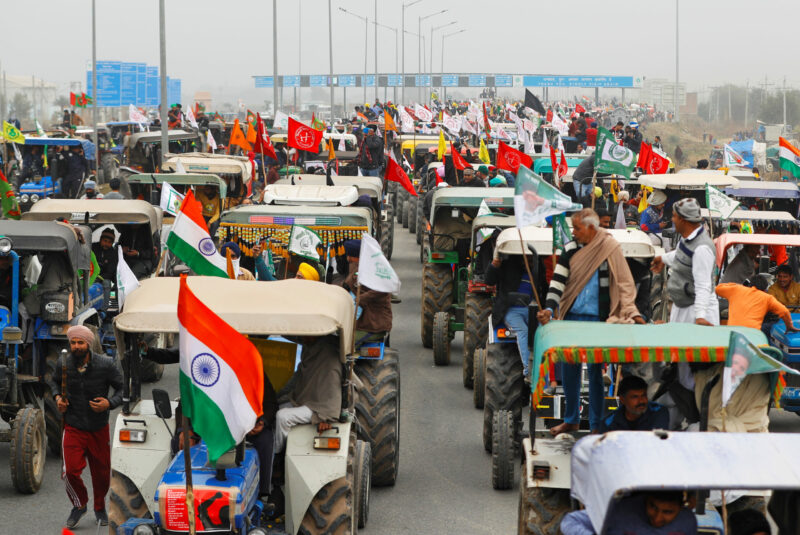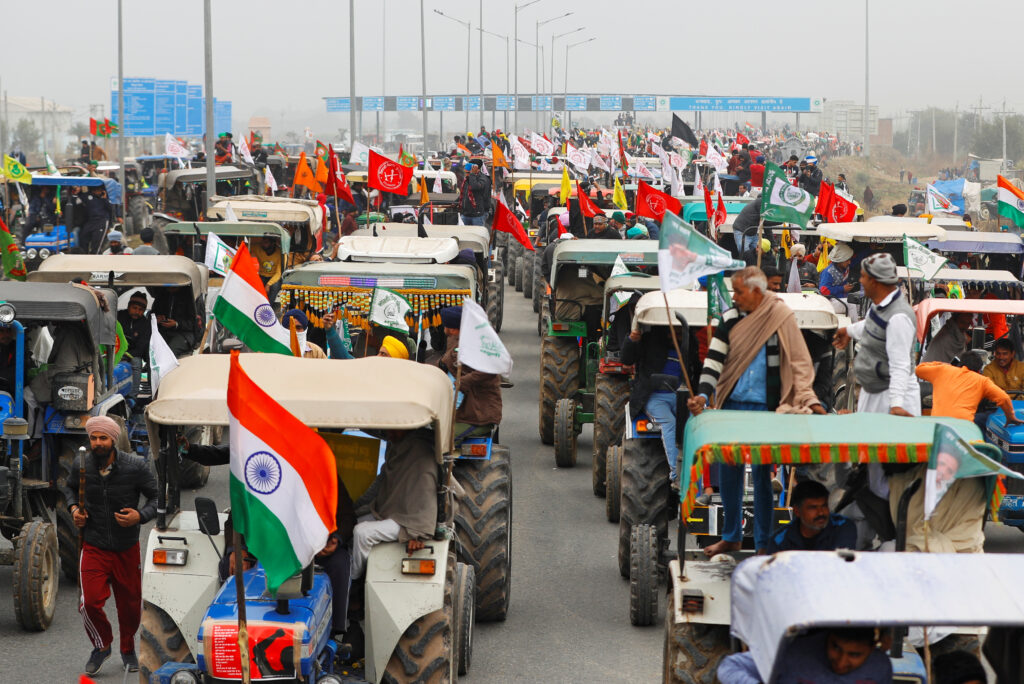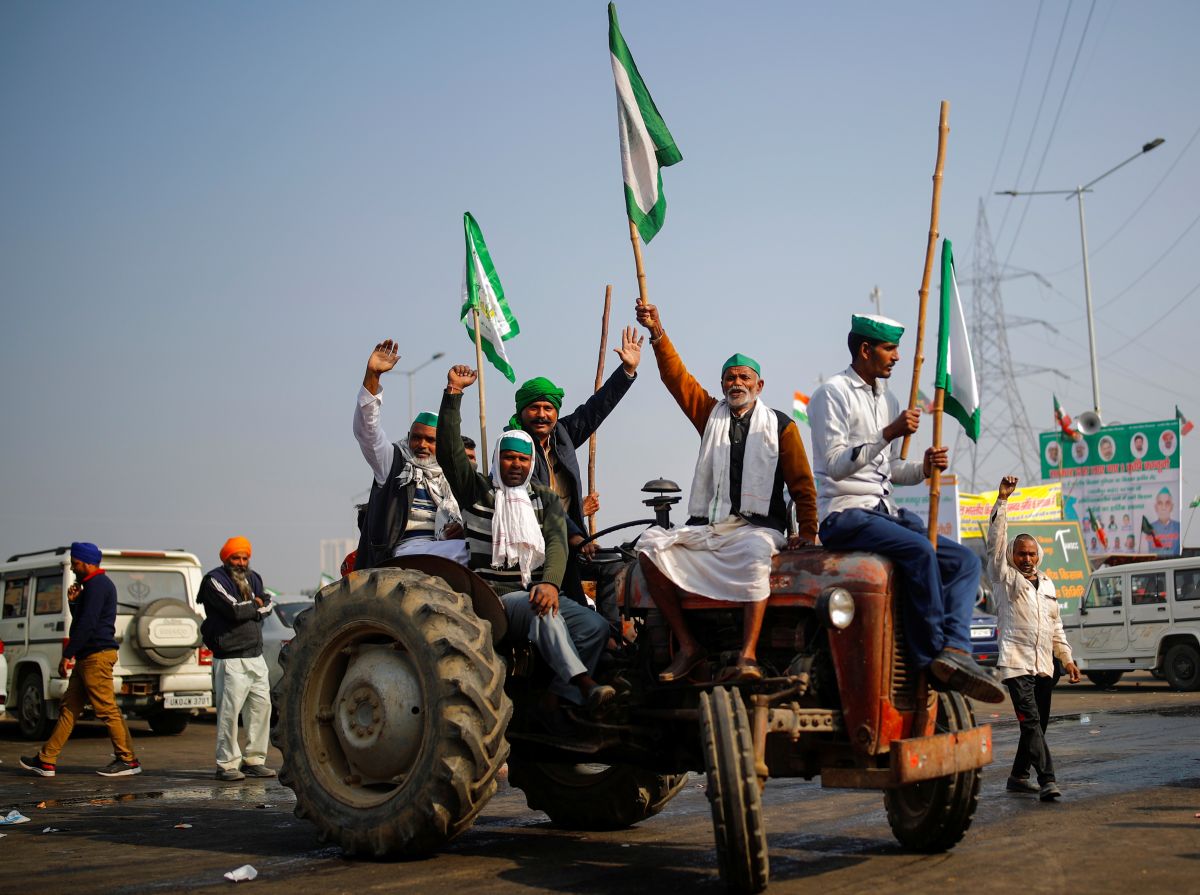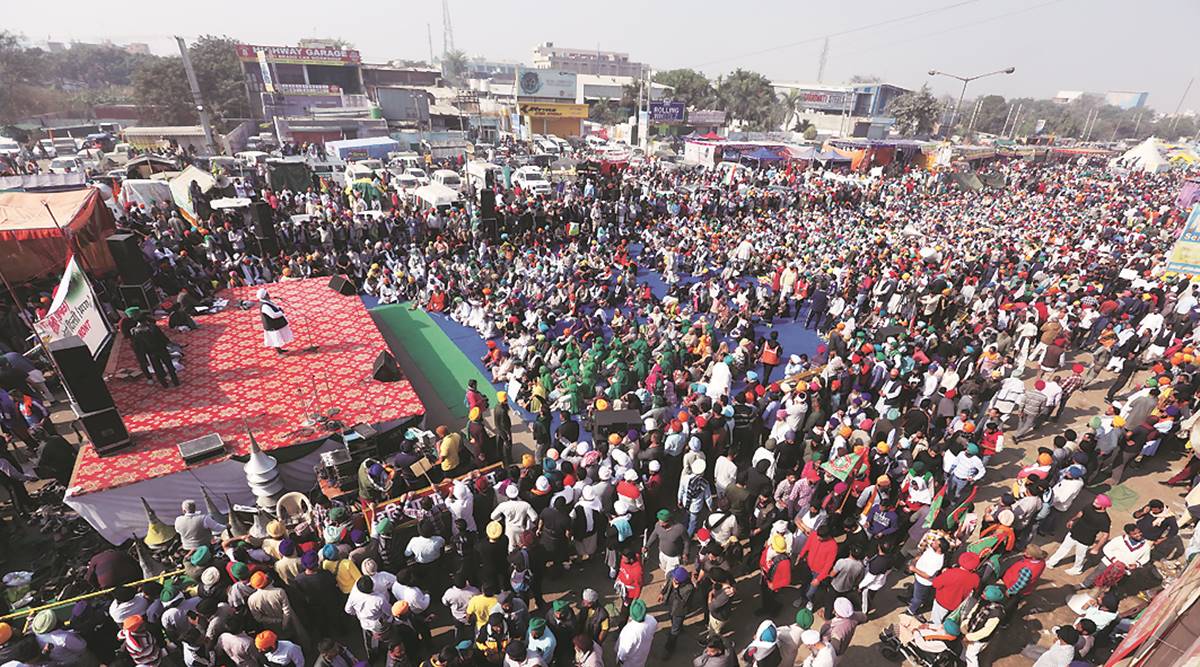India’s farmers organise in large numbers on 26 January, allege conspiracy to break the movement.

On 26th January, India’s Republic Day, the country’s farmers organised massive demonstrations in New Delhi, and elsewhere stepping up their protests against the pro-business reforms in the agricultural sector.

“It was unprecedented and historic. We estimate that over 200,000 tractors took part in the rallies across India. The whole world was watching. ” said one of the farm leaders spearheading the protest.
At the national capital, a section of the protestors broke away from the main group and drove the tractors into the city, leading to clashes with the police. However Samyukta Kisan Morcha, an umbrella coalition of nearly 40 farmers unions from UP, Uttarakhand, Haryana, MP, and Punjab alleged it as a conspiracy to malign the peaceful protests that have been taking place since over three months.
“A majority of the farmers in Delhi were peaceful and they followed the designated route. We are proud of the large turnout that we witnessed today and it shows how upset our community is with these laws.” Rakesh Tikait of BKU said.

At a press conference held on 27th evening, the leaders of the coalition also denounced the violent clashes.
“The clashes that took place with the police is condemnable. The government should investigate who these people are, who tried to vitiate the atmosphere and we suspect a conspiracy here, as some of the perpetrators of the violence have also been seen in the past promoting the ruling party’s political campaigns. A thorough investigation must take place to expose this conspiracy. Investigation must also take place into how these violent elements were allowed to roam free for several hours, despite heavy presence of cops. Who wanted this violence? Who wanted to vitiate the atmosphere? Who benefits from it? We are upset and saddened that an important day like the Republic Day was used to divide a peaceful movement”.
Reports have emerged that cases have been filed against protesting union leaders. In the Southern States of India protests were held in Bengaluru, Hyderabad, Coimbatore and Thanjavur.
For several months now, India’s farmers have been relentlessly agitating against three controversial legislation that if read together, could dismantle the country’s public procurement system, will push down prices of farm produce, encourage large scale monoculture cultivation through contract farming, and also allow private businesses to stock up and speculate on essential pulses and cereals, thus driving up food prices.

Writing for The Wire, Narendar Pani, a renowned academic, sums up it up. “The three farm Acts that are now in dispute were the instruments that were to open up agriculture to the market. The Essential Commodities Act was amended to limit the scope for the government to intervene to reduce stocks when prices increased, only allowing for such interventions when there was a very substantial increase in price. The amendment also ensured that those who packaged a food product could stock virtually as much as they liked. A second legislative step removed the existing support system for the Agricultural Produce Market Committees (APMCs) in the state. And the third Act set out the nature of the agreement between the farmer and the trader. These free market reforms were to provide the farmer access to higher prices by tapping national and international markets. If economists have tried to sell the farmers the dream of higher prices, the farmers have been, understandably, more concerned with the risks of a crash in prices. The entry of large players with deep pockets could first starve the APMC trading yards of stocks, and when the APMC yards did not survive the farmers would have no option but to sell to the large private traders. The strategy followed by larger telecom players could just as easily by used to first demolish the effectiveness of APMCs and then take over the market.
P Sainath, a highly respected journalist and the founder of People’s Archive of Rural India, explains that these “reforms” will adversely affect not just farmers but also all ordinary citizens.
“Welcome to Section 13 of The Farmers’ Produce Trade and Commerce (Promotion and Facilitation) Act, 2020 (the one aimed at gutting the Agriculture Produce Marketing Committees, better known as APMCs). And you thought the new laws were only about farmers? Sure, there are other laws that also exclude prosecution of civil servants for carrying out their legal duties. But this one goes way over the top. The immunity given to all those in respect of anything, acting ‘in good faith,’ whatever they do, is sweeping. Not only can they not be taken to the courts for a crime they may have committed ‘in good faith’ – they’re protected against legal action for crimes they are yet to commit (‘in good faith’ of course). Just in case you missed the point – that you have no legal recourse in the courts – Section 15 rubs it in: “No civil court shall have jurisdiction to entertain any suit or proceedings in respect of any matter, the cognisance of which can be taken and disposed of by any authority empowered by or under this Act or the rules made thereunder.”. Who is the ‘any other person’ doing things ‘in good faith’ who cannot be legally challenged? Hint: try listening to the names of corporate giants that the protesting farmers are chanting. This is about the ease of business – of very, very Big Business.”
Writing for The Hindu, Utsa Patnaik, a highly respected economist notes.
“It is not just domestic firms that are potential beneficiaries of the new farm laws; foreign agribusinesses are a danger too “Northern industrial countries, namely the United States, Canada and the European Union (EU), cannot produce the tropical and sub-tropical crops in high demand by their own consumers while they have mountains of surplus grain and dairy products, the only goods their single-crop lands are capable of producing for climatic reasons. They must find export markets for these. For over two decades, they have put relentless pressure on developing countries to give up their own public procurement systems, insisting that they should buy their food grains from advanced countries, while diverting their food-crop-producing land to contract farming of export crops that these industrial countries want but cannot themselves produce. In short, they want a re-creation of the economic scenario of the colonial period.”
“This government is stubborn and obstinate. If the British could yield to Sir Chhotu Ram (legendary peasant leader) in 1943 – when he demanded raising the official ceiling price of wheat and farmers threatened to burn their standing crop – why can’t the Narendra Modi government repeal these three laws?,” asks Naresh Singh Tikait, president of the Bhartiya Kisan Union (BKU) that his late father founded in 1987.
In a video message Rakesh Tikait of the Bhartiya Kisan Union reiterated the plans ahead.
“The coalition of unions have announced a day of fasting on 30th January, the birth anniversary of Mahatma Gandhi. The parade was a huge success in displaying our collective strength. We must continue with our peaceful protests in different sites, until the three laws are repealed. We won’t return home, until the government recalls the three laws.”
